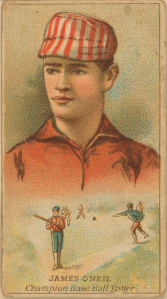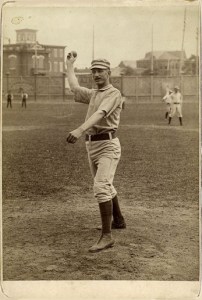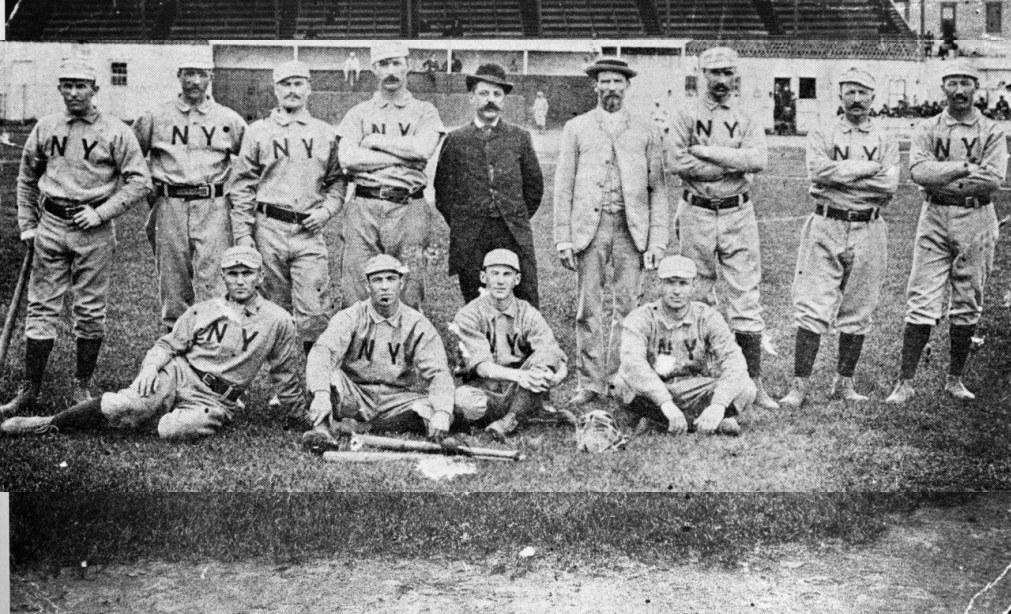When we last left the 1883 New York Gothams, they had just finished up a home stand that featured a hard fought series with the Buffalo Bisons and the Cleveland Blues.
 Now the Gothams were headed out on the road to New England to face two of the National League’s toughest teams.
Now the Gothams were headed out on the road to New England to face two of the National League’s toughest teams.
Before we get to the action, it is worth noting how different baseball in 1883 was compared to today’s game.
Errors were a frequent occurrence in most games and this led to spectacular number of unearned runs per game. There were 4,565 runs scored in the National League in 1883, of which 2,142 were unearned. That is 46.9% of the total runs scored that year.
So when you read that teams averaged 5.8 runs a game in 1883, it is not because hitters were supercharged PED-enhanced monsters, it was simply because the baseball glove had not been invented yet.
Also, the overall numbers are skewed even more by the dismal performance of the Philadelphia Phillies who allowed a staggering 8.96 runs per game that season.
So keep that in mind as we discuss the Gothams’ mid-June trip to New England, where they would play against two of the National League’s strongest teams, the Boston Beaneaters (now the Atlanta Braves) and the Providence Grays (now defunct).
The Gothams were in fifth place, only 1.5 games behind the fourth place Beaneaters, who were 16-15. Not bad for an expansion club.
Tip O’Neill, who began the season as the Gothams’ third pitcher, had supplanted the ailing righthander John Ward as the club’s number two starter. He was now alternating mound duties with “Smiling” Mickey Welch.
In 1883, it was still quite common for a team to use one pitcher to pitch 2/3 or more of the team’s total innings. The fact that the Gothams were alternating mound duties with two pitchers was somewhat innovative for the time. It’s kind of like teams experimenting with a six-man rotation now.
O’Neill was given the first start of the road tr
The game was a close one, though quite sloppy. O’Neill fell to the Grays by a score of 6-5. If you look at the contemporary box scores of this game, O’Neill was charged with an amazing nine errors. I was confused by this number. Nine errors by one player in one game is pretty unfathomable, even by 1883 standards when the baseball glove was still two years away.
Even Tommy John on his worst day only made 3 errors on a single play (you can see that play here).
I checked Baseball-Reference and O’Neill is credited with just 3 errors as a pitcher in 1883. I couldn’t figure out where the discrepancy lay.
I figured maybe it was a typo in the box score and didn’t think much more of it. Then I found the answer in an unexpected place.
While on vacation the past couple weeks, I read Keith Law’s new book Smart Baseball. It’s a must read for any analytics oriented fan, and even as someone who has been reading Bill James since I was teenager I learned a metric ton from the book… including the source of Tip O’Neill’s nine errors.
As Law noted, there was a strange rule in effect in 1883 by which pitcher walks were charged as errors to the pitcher. So O’Neill’s nine errors were actually nine bases on balls.
Still, it was a terrible performance (especially since it took eight balls to get a walk in 1883), but not quite as insane as making nine errors in one game.
As we discussed a few weeks ago, O’Neill’s wildness inadvertently led to his permanent move to the outfield, where he became the 1880’s version of Barry Bonds.
Following O’Neill’s wild outing, Mickey Welch was New York’s starter the following day. He pitched a strong game and outduelled Radbourn by a score of 4-2.
After that series, the Gothams traveled 50 miles up the road to Boston to play the Beaneaters on June 21st. The Gothams had opened the 1883 season, the first of their 135-year history, with a 3-game sweep over the Beaneaters. Would history repeat itself?
Tip O’Neill was back in the pitchers’ box to face “Grasshopper” Jim Whitney in the series opener. This time around, O’Neill had much better control and came out on top with a 5-4 victory. The win brought the Gothams to a record of 16-17, still within striking distance of the first division. Not bad for an expansion club, particularly when compared to the National League’s other inaugural entry, the Philadelphia Phillies, who were in last place with a calamitous 8-28 record.
Mickey Welch took the mound the next day hoping to keep the momentum going.

He faced Charlie Buffinton, one of the great forgotten pitchers of the 19th century. In a career that spanned from 1882 to 1892, he won 233 games with a 115 ERA+. Buffinton pitched a great game. As the Sporting Life put it, “The New Yorks… failed to connect with Buffinton’s puzzling balls and were shut out.” Heh heh… Buffinton’s puzzling balls.
Buoyed by the strength of Buffinton’s pitching, the Beaneaters torched Welch for 10 runs and cruised to a 10-0 victory.
Charles Buffinton and his puzzling balls.
The Gothams traveled back to Providence to face the indefatigable Radbourn on June 23rd. “Tip” O’Neill brought his gas can to the bump (to quote Jim Rome, remember him?) and gave up five runs in the first inning before being replaced by Johnny Ward. The final score was 12-4.
(See the obligatory Jim Rome video here.)
June 24th was a Sunday, which in 1883 meant it was illegal to play baseball in New England, so no game took place. Sunday baseball (the religious “Sabbath”) was outlawed in many major league cities even into the 20th century.
So the two clubs were back on the field on Monday, June 25th. The result was similar to Saturday’s crushing defeat as Providence took the game by a score of 12-3.
Gothams shortstop Ed Caskins made three errors that led to five unearned runs. Caskins was the club’s utility man, filling in mostly at second base and shortstop, while also playing catcher on occasion. He was a light hitter, with a career slash line of .228/.261/.269, but was a great fielder, having finished in the top ten in defensive WAR in 1881. Even then, he still made 67 errors in 81 games in 1883.
On June 26th, the Gothams traveled back to Boston and fell 7-2 in a brisk game that lasted all of 82 minutes. On June 28th, the Gothams finished up their rocky road trip with a disastrous 18-8 loss to the Beaneaters.
That loss was their fifth in a row, and the club had been outscored a whopping 59 to 17 runs in those five losses.
The final loss to the Beaneaters in game #38 of the season dropped the club down to sixth place with a 16-22 record and put them 11.5 games out of first place.
With 60 more games to go in their 98-game season, the New York Gothams had their work cut out for them.
Add The Sports Daily to your Google News Feed!
